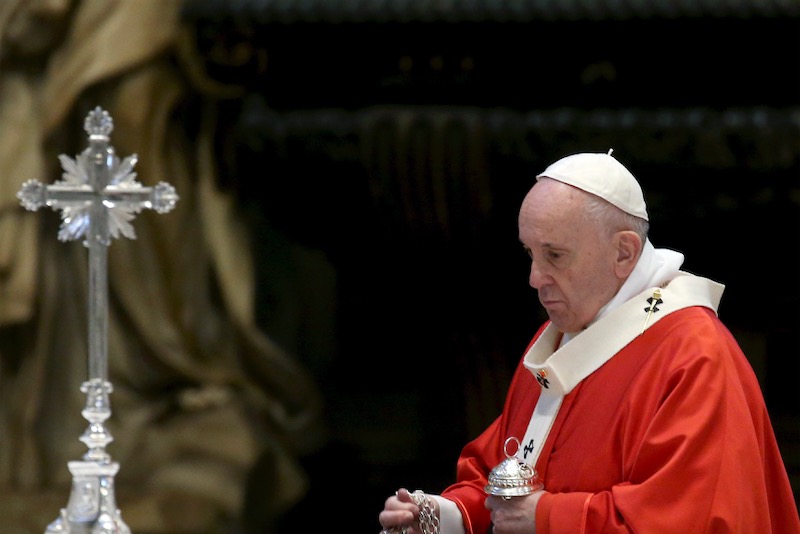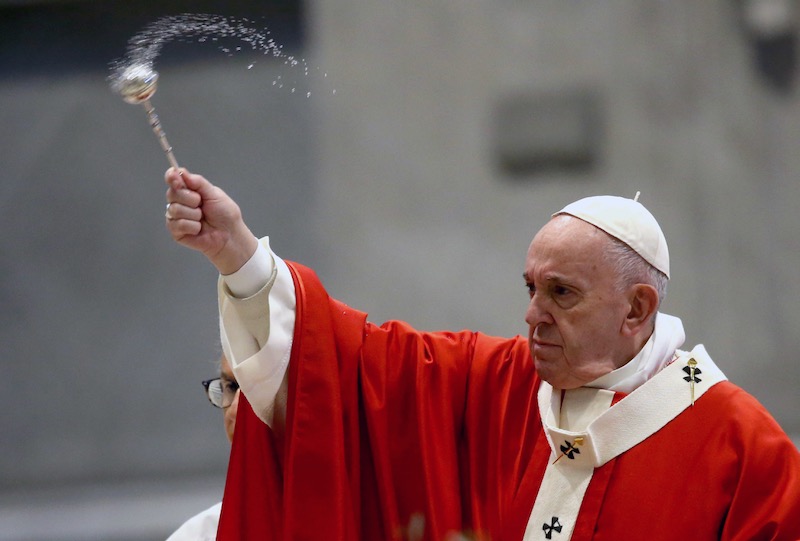Pope Francis has offered a powerful message of hope during the coronavirus pandemic, in his first ever interview with a British journalist.
He believes the Covid-19 pandemic is a "place of conversion", a chance we must not let slip away.
And he says the Church will come out of the Covid-19 crisis with its institutions reconfigured according to the spirit of early Christianity, and less attached to "certain ways" of thinking.
Francis was speaking to papal biographer Austen Ivereigh in an interview published exclusively by The Tablet and Commonweal. It is the pope’s first English language interview with Catholic media and his first with a British journalist.
He focuses on his response to the Coronavirus pandemic.
"What we are living now is a place of conversion, and we have the chance to begin. So let’s not let it slip from us, and let’s move ahead," he says.
We have to respond to confinement with creativity. "We can either get depressed and alienated – through media that can take us out of our reality – or we can get creative."
He explains what he means by conversion: "Go down into the underground, and pass from the hyper-virtual, fleshless world to the suffering flesh of the poor. This is the conversion we have to undergo. And if we don’t start there, there will be no conversion."
The pope sent a recorded audio reply to a series of questions, and in one of them Dr Ivereigh asks if the 83-year-old Roman pontiff sees the future of the Church as “less attached” to institutions.
“Less attached to institutions? I’d say less attached to certain ways of thinking,” Francis, 83, replies.
“We have to learn to live in a Church that exists in the tension between harmony and disorder provoked by the Holy Spirit. If you ask me which book of theology can best help you understand this, it would be the Acts of the Apostles. There you will see how the Holy Spirit de-institutionalises what is no longer of use, and institutionalises the future of the Church. That is the Church that needs to come out of the crisis.”
He defends the Church as an institution. "A Church that is free is not an anarchic Church, because freedom is God’s gift. An institutional Church means a Church institutionalised by the Holy Spirit."
Covid-19 has led to closures of church buildings and the suspension of liturgies, forcing Catholics to worship at home or follow live-streamed Masses. It has led to comparisons with the early centuries of the church when Christians gathered in their homes to pray.
During the interview, the pope talked about an Italian bishop who had called him “flustered” because he wanted to give a general absolution – forgiveness of sins without individual confession – from the hallway of a hospital to patients in their wards.
“He had spoken to canon lawyers who had told him he couldn’t, that absolution could only be given in direct contact. ‘What do you think, Father?’ he had asked me,” the pope explained. “I told him: ‘Bishop, fulfil your priestly duty.’ And the bishop said ‘Grazie, ho capito’ (“Thank you, I understand”). I found out later that he was giving absolution all around the place”.
During the Covid-19 pandemic, the Vatican has given special permission for general absolution to be given to people unable to access a priest for fear of contagion, while Francis has encouraged individual believers to confess their sins directly to God.
“This is the freedom of the Spirit in the midst of a crisis, not a Church closed off in institutions,” the pope explains in the interview. “That doesn’t mean that canon law is not important: it is, it helps, and please let’s make good use of it, it is for our good".
Francis reflects in the interview on the economic impact of the lockdowns put in place to stop the spread of the coronavirus, and how governments have responded to the crisis. The Pope says the virus has revealed how “all our thinking, like it or not, has been shaped around the economy” and that in “the world of finance it has seemed normal to sacrifice [people], to practise a politics of the throwaway culture, from the beginning to the end of life.”
He says the “throwaway culture” brought to mind Pope Paul VI’s encyclical Humanae Vitae, which controversially reasserted the Church’s ban on the use of artificial contraception. Francis argues the encyclical was prophetic for predicting future attempts to control the size of the human population.
The pope explains at the beginning of the discussion that during the lockdown the Roman Curia is working in shifts in order to keep running, and in his Casa Santa Marta residence the community are sticking to the measures ordered by health authorities.
Given his age, the pope is vulnerable were he to catch the highly infectious bug. One resident of the Casa Santa Marta has already tested positive for Covid-19 and the Vatican has seven cases of those with the virus. Although Francis came down with a protracted cold last month, he has tested negative for the virus.
“Here in the Santa Marta residence we now have two shifts for meals, which helps a lot to alleviate the impact,” he explained. “Everyone works in his office or from his room, using technology. Everyone is working; there are no idlers here.”
The Vatican, he says, is trying to plan the “tragic and painful” aftermath of the crisis. Francis points to those suffering financially as a result of Covid-19 as the “new deprived” and looking to the future cites Virgil’s “Aeneid” when Aeneas suffers a devastating defeat at Troy. Two paths open up for Aeneas, the pope explains: “to remain there to weep and end his life” or to follow “his heart”, make for the mountain and end the war.
"So: to be in lockdown, but yearning, with that memory that yearns and begets hope – this is what will help us escape our confinement," he says.
In an article for Thinking Faith, Austen Ivereigh explains how he achieved the interview.
He says: "It was the last week of March, and the world was in lockdown. I had reached out to Francis on impulse: the virus crisis was now hitting the English-speaking world hard, and I felt we needed to hear from him."
Ivereigh adds: "What the interview shows is that we are not just passive spectators in this process, but its agents; it is our choices that will condition the future that is being incubated."
The pope is thinking, he says, of how to accompany the people of God at this time. Lockdown imposes isolation, distance, solitude: the question is how to break through these walls.
Read the full interview that Pope Francis gave to Austen Ivereigh.



 Loading ...
Loading ...